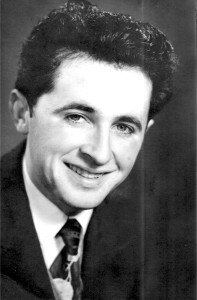By Msgr. Francis A. Carbine
”I’ll take you home again, Kathleen, / To where your heart has ever been / Since you were first my bonnie bride / Across the ocean wild and wide.”
“This is my favorite song” said Charlie Martin. “Both Bing Crosby and Elvis Presley helped keep it popular. Over the years, I had a handful of girlfriends named ‘Kathleen,’ and also that’s the name of my wife!”
Born on the Townland of Letterbarrow, County Donegal, Charles Martin attended Arbane National School. “There were two teachers and twenty-five students. I left school at age fourteen.
“My father worked an eleven-acre farm. He had a few cattle and sheep, and raised potatoes, turnips, carrots and cabbage. I had five siblings. All came to Pennsylvania. Eventually, my parents, Hannah and Andrew, also came. They are buried in Holy Cross Cemetery, Yeadon.
“As a boy, we walked to the monthly Fair in Donegal Town. For me, this was a major treat. My father might sell a few calves. The Fair was also a social occasion. The men went to Gallagher’s Pub near the Castle, or to the bar in the Abbey Hotel on the Diamond in the Town.
“I have a very vivid memory of a salesman — an African man — selling ‘Crocodile Oil’ — his guaranteed cure for everything! Donegal Town had paved streets and electricity. Letterbarrow had neither!”
For one year, Charlie worked at the local Magee Tweed Factory, and for the Electric Supply Board bringing electricity into the Townlands.
Eventually, he traveled to Dublin to get his passport at the Irish Embassy. He stayed overnight at a rooming-house run by the Maguire Sisters from the Frosses, County Donegal. “I recall that all the Donegal people stayed there.” In 1956, at age 17, he left Ireland for England.
“Here work was readily available” he recalled. “You could leave a site on Friday and have a new job on Monday. I did construction, laid electric cables, and worked in a sugar refinery that made sugar and molasses out of beets. In England, our Irish community was very tight!”
On Sunday, February 1, 1959, he landed in Philadelphia. ”I initially stayed with my aunt and uncle in Yeadon. I remember that I arrived at 2 a.m., and for the rest of the night, we talked away! Then we went to Mass at St. Louis Church.”
Charlie later moved to Southwest Philadelphia where he stayed with cousins. “While the district was very large, it was very clean. Everybody seem to know one another. I was very impressed.”
His employment was with Kent’s Clothing Mill, Clifton Heights, and Sealtest Ice Cream. In 1962, he began two years in the U.S. Army: Washington State, Nevada and Arizona. “After my discharge, I went back to Sealtest. For three years I delivered milk.
“In 1965, I became assistant manager for a Bill Collecting Company. Our office was in Kensington, Philadelphia. In those years, the district was safe and the people, friendly. I never felt threatened.”
He moved on to the Philadelphia National Bank. “Much of my training was ‘on the job.’ I later worked for Girard Bank, Atlantic Finance, and Wells Fargo Bank. After 13 years, I retired as a Vice President, Automobile Credit Division.”
Charlie did not return to Ireland until 1985. “The stone walls of our house were intact, but the thatched roof had fallen in. A sad scene!
“As a boy, if you received a ball point pen for Christmas, you were happy. Being poor didn’t bother us. There were not too many people around to be jealous of!”
Today, Charlie is a volunteer at St. Francis Inn – very near his first office at “K and A.” Also volunteering are his brother, Pat Martin; sisters-in-law, Kathleen Martin and Mary Martin; and cousin, Rose Martin. “As volunteers, we are surrounded by people of faith.”
Charlie returned to Donegal for reunions in 2000 and 2003. He attended the Donegal Ball in 2014 and 2016.
As a man from Ireland – “where the fields are fresh and green” — he compliments Irish Americans: “They often know more about Ireland than I do. They are very sincere about their Irish heritage.”

